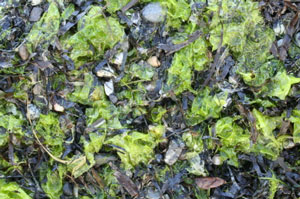 |
Can I use seaweed for composting? The ThriftyFun community gives advice to coastal dwellers. Post your own tips here.
I saw part of a really interesting movie filmed in Scotland. The farmer was hauling seaweed from the sea to spread on his field. I think seawood would be a great compost material, added like leaves. Maybe layer soil, seaweed, newspaper and kitchen scraps. I sometimes catch rain water in big plastic tubs. Algae grows in it and I dump it on my compost.
Liz
I'm not sure about composting seaweed, but you can make a fantastic seaweed liquid fertilizer. What you do is to find an old metal drum, or plastic garbage (trash) container of 10 gallons capacity. Half fill it with seaweed, topping it up with water and allow it to stand for 3 months. This liquid is very strong and must be diluted before use. If it's too strong, it can cause burning of plant roots. A solution of half a cup of stock liquid fertilizer to a bucket of water, or 4 fl oz for every 2 gallons. I have used this once and had a great success. Now that I've moved close to the beach again, I will probably adopt this once more.
Cheers
Bev in Oz
I do a lot of gardening and composting. The first thing you would want to do is go to sites and learn about composting in general. There are ratios of the dry to wet matters, usualy given in a carbon ratio (carbon is the dry stuff). If you do not have a lot of leaves, torn newspaper is a great substitute as it has a very high carbon content and if you have a lot of green/wet matter it will break down faster (cellulose in the newprint breaks down slower than leaves and other things).
I also live by the coast and contacted the local extention to ask about added salt to my compost. Their suggestion was to only gather seaweed after a storm. The fresh seaweed has a lower salt content than seaweed near the shore that is exposed repeatedly with the tides. Also, they said if you are using it regularly, it would be a good idea to rinse it off to remove some of the salt water as a precaution. (just so you know, used coffee grounds are also a great addition and count as wet matter but well worth finding more dry to compensate). I did take care of the "where do I find more dry" problem a couple of easy ways.
I have three huge compost piles (4'h x 6'diameter rounds in fencing) in varied degrees of "doneness". I'm thinking of adding another church to my "repertorie". I also drive the neighborhoods when it's "leaf time". When people are raking, I ask them if I might take a bag of leaves for my compost. Never got a "no" yet, and have met some really nice people that call me when they will be cleaning up so I can stop by if I want too!!
Just watch that salt! PH is adjusted very well in the normal process of composting so that's not as big a worry. Good luck!
By Kathy
Absolutely, it is prized as compost. Better than cow manure in nutrients. You are sitting on a goldmine
By Ciro
To use your seaweed as fertilizer it is best to dry it out, then crush it and mix into soil. This is the method I use each year with fantastic results. Good luck! PS: You will need a lot of seaweed for this, it dries up to a small amount!
By Lynda
"In a compost heap, any material that once lived can be recycled. Anything that will break down into good organic matter may be used. Such as: animal and bird manures, kitchen scraps, seaweed or seagrass, grass clippings, straw, weeds, shredded vegetation, newspaper, untreated sawdust."
http://www.organicdownunder.com/Compost.htm
"An important consideration is the effect of salt from the seaweed on the sodium absorption ratio (SAR) of the soil, which in turn affects soil permeability (High SAR is associated with decreased permeability in clay soils). Without going into a lot of detail on soil chemistry and calculations to determine SAR (consult a soil chemistry text if you want to know details), you want to keep SAR low (generally below 10) by minimizing the amount of sodium (salt) you apply to soil.
Source: Colorado State Discussion List (Archive No Longer Available)
"Someone else has replied about the nitrogen, but I should like to point out seaweed is a good source of most of the trace elements which plants need for good health. As the land erodes away all the mineral elements in the rocks eventually end up in the sea where they are taken up by both sea plants and animals. (So both seaweed and fish wastes are good mineral sources.) In addition seaweeds have been found to contain plant growth hormones and other goodies which enhance their fertilizing capacity. While fresh seaweed has the most "goodies" even the black stuff should have value and if it has lain about in the rain probably most of the loose salt has washed off."
Source: Colorado State Discussion List (Archive No Longer Available)
From the Recycling Advisory Group Scotland
"Yes seaweed can be composted but there are both good and bad sides." The article is rather long. You can read it here:
Happy Gardening!
Doris in VA
I'm from Ayrshire in Scotland and the Ayrshire potatoes have always been held in high regard. The reason is that seaweed is used as a fertilizer on the fields. On thing I would do is leave the seaweed outside for a few days, either in the rain or use the hose, to wash off excess salt then add to the compost pile.
(04/27/2007)
By Greg
Add your voice! Click below to comment. ThriftyFun is powered by your wisdom!